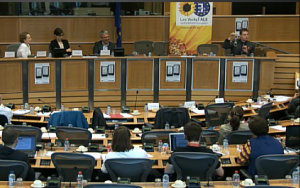A new EU legislative framework proposal was published some time ago amied at combating (large scale) attacks against info systems. Learning from major past criminal offenses it is obviously in the interest of Europe to be prepared against such attacks and punish those who committed them. The emphasis on the last part of the sentence as one wouldn’t punish the “hammer maker if once another person breaks the window with the hammer.” Clear definitions are crucial for this case and we need a bit more here than correcting grammatical faults in amendments. When voting on the issue in plenary the EP should consider that Europe is and has to remain a place for innovative software development.
Document Freedom Day conference, European Parliament, Brussels, Belgium
28th of March we celebrated the DFD in the EP, where a conference took place on this occasion.
Karsten Gerloff , president of FSFE gave a speech on the subject from a historical perspective, through the evolution of books, printing until the period of eBooks. This explained to the participants how things evolved and how we all became sort of printing press with technical change.
, president of FSFE gave a speech on the subject from a historical perspective, through the evolution of books, printing until the period of eBooks. This explained to the participants how things evolved and how we all became sort of printing press with technical change.
Whatever change the digital age brought, books still matter and the access to knowledge, memories, still remains in the interest of everyone.
Here at this point to give more emphasis on the argument that we, readers need Open Standards to own our books and not to give the control over them to companies he took the DFD handcuffs. (see picture)
It was a successful & surprising wake up moment for the audience…
Why are Open Standards important for the ebook market?
The e-publishing sector develops rapidly and offers several business opportunities as well as comfortable solutions for the readers. However the question remains-to what extent will readers be able to really own their ebooks? And does the ebook market really offer the freedom of choice?
The answer relies on Open Standards which are essential for interoperability, users’ freedom of choice and in addition help to avoid vendor lock-in. Once we buy or write a book it’s natural to expect that we fully possess it, can enjoy its content everytime and everywhere and of course pass it to someone else if we feel like. Although unfortunately in the digital environment this is less evident.
Stressing the public interest in non-market sharing of ebooks doesn’t mean that Open Standards on the ebook market don’t offer business opportunities at all. There are several existing business models which by recognizing the needs of a wider public, try to ensure that the ebooks are enjoyable regardless of file format or publisher .
DFD in the European Parliament
Conference on the occasion of DFD: Open Standards in the eBook market
T heme: How do Open Standards impact both universal access to the Public Domain and business
heme: How do Open Standards impact both universal access to the Public Domain and business
Will be a great opportunity to celebrate information accessibility and raise awareness of Open Standards inside the EP
http://www.greens-efa.eu/document-freedom-day-5297.html
IPRED next episode
*the use of provisional and precautionary measures, procedures to gather and preserve evidence (problem of relation between the right of information and protection of privacy)
*the meaning of various corrective measures, including the costs of destruction, the calculation of damages”
“34. Draws attention, furthermore, to the growing problem of *Internet-based industrial espionage* and *theft of data* constituting industrial property, in particular technical documentation and source code;35. Proposes that the Observatory should carry out a detailed analysis of the problem of *data theft* and put forward proposals for combating the problem;”This is not a legally binding document but it will prepare the work of the Commission with its advices.
13. Calls on the Commission to ensure that the measures aimed at strengthening the application of intellectual property rights in the internal market do not impinge on the legitimate right to interoperability, this being essential to healthy competition on the digital works distribution market, inter alia for the authors and users of free software;
Additional conclusions:
- directive should only apply to “for-profit infringements”, or acts carried on with “commercial intent”
- it should not mixes up all kinds of infringements
- should be i line with the Directive 2009/24/EC on the legal protection of computer programs (decompilation part)
The Polish plumber
Image of the Polish Plumber, myth resulting from the debate on the Directive on services in the internal market. He was followed by the Polish Nurse.
resulting from the debate on the Directive on services in the internal market. He was followed by the Polish Nurse.
Central Europe still rulez 😛
Unitary patent
BACKGROUND
Patent law is national in nature. If a business obtains a patent in one
country, it only covers that country. To affect a competing business in
France or Germany, an innovative business must obtain patents in France
and Germany. Until 1978, separate patent applications had to be filed
country by country. When the EPO started in 1978, a single application
could be filed at the EPO to cover all participating countries. This is
a unified application process and not a unified patent. Once the patent
is granted by the EPO, it splits from a single application into a bundle
of national patents. These must then be validated in each state of
interest.
After grant, the various patents then have to be renewed, enforced,
revoked and transferred separately in each country. Where patent
infringement occurs in more than one country, this can mean bringing
court cases in multiple jurisdictions.
SWPAT
excluded officially by the EPC (article 52 (c)) but the interpretation of the words “as such” have caused a lot of problems and the EPO still issues swapts.
With the relaunch of the unitary patent question there’s another probable way to get through swpats.
THE CURRENT DOCUMENTS
• a draft Patent Regulation for a Unitary European Patent
• a draft Regulation for the languages regime for the Unitary European Patent
• a draft Court Agreement
• ancillary documents for setting up and running the Court
The Unitary European Patent
As Spain and Italy have objected, this proposal currently covers only 25
of the 27 Member States of the European Union (the “Participating Member
States”). = Enhanced Co-operation Procedure
Draft Regulation: when an application filed with the EPO reaches
grant, the applicant can choose(within one month of grant) whether to
convert the 25 patents for the Participating Member States into a
Unitary European Patent.
Any remaining patents which the applicant wants to keep from the bundle
of granted patents will need to be validated nationally within three
months of grant in each of the other countries.
The provisions for the granting and revocation of patents by the EPO are
still set out in EPC the (European Patent Convention). This sets out:
how the EPO operates
for what it will grant patents
how it should do so
The EPO is not part of the European Union
There are several complications concerning the unitary patent package besides the language question. The ECJ also issued an opinion which said that the Draft Agreement on the Unified Patent Court is not compatible with the EU law.
Democracy requires Free Software -HU
Finally the Hungarian version of the article ‘Democracy requires Free Software‘ is ready! Felt it was something more than a simple translation.
PDF Reader campaign results in Hungary